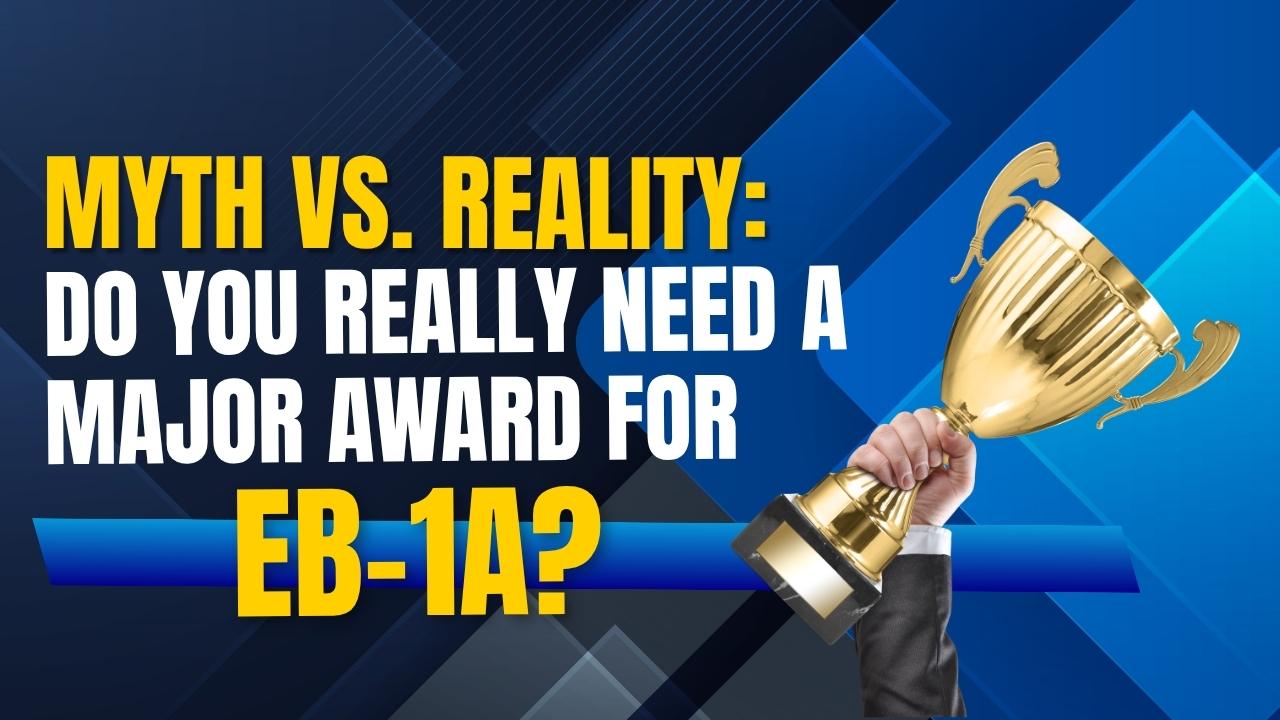When it comes to U.S. immigration, few categories spark as much curiosity-and confusion-as the EB-1A visa. Known as the “Extraordinary Ability” green card, this visa opens doors for highly talented professionals, entrepreneurs, researchers, and artists from around the world.
In our last blog, we kicked off a series called “The 10 Golden Keys to the EB-1A” where we explore each of the EB-1A criteria in detail, starting with Awards. But we also know that facts alone aren’t enough. Many talented professionals hesitate to apply because of misconceptions about who qualifies.
That’s why, in addition to walking you through the criteria one by one, we’re also dedicating space in this series to myth-busting. By separating fact from fiction, we aim to help you see the EB-1A for what it really is: a powerful but achievable pathway for those who can prove extraordinary ability.
In our ongoing series, “The 10 Golden Keys to the EB-1A,” we’ve started by unlocking the very first key: Awards. Awards can be one of the most compelling ways to prove extraordinary ability, but they are also one of the most misunderstood criteria.
Many professionals wrongly assume their awards are “too small” or, on the other hand, think that any certificate will do. These misconceptions lead to missed opportunities-or weak petitions.
But first, let’s understand, why awards are so important.
Why Awards Are Powerful
Awards often provide the clearest form of third-party validation. They show that experts and respected organizations recognize your talent and contribution. For USCIS, this external recognition is harder to dispute than self-claims of excellence.
When documented properly, awards can transform an EB-1A petition from strong to extraordinary.
But as powerful as awards are, there are also many myths and misconceptions about what really counts. Some applicants underestimate their achievements, while others mistakenly rely on certificates that don’t meet USCIS standards. That’s why it’s so important to separate fact from fiction when using awards as one of your EB-1A keys.
So today, let’s dive into a special myth-busting edition focused solely on the Awards criterion of the EB-1A visa. Let’s break down the most common myths about EB-1A and uncover the truth.
Myth 1: “Only world-famous awards count.”
Reality: While Nobel Prizes, Oscars, and Olympic medals are strong evidence, they are not required. The EB-1A standard allows for national or even regional awards-as long as they are merit-based, selective, and prestigious in your field.
Example: A national innovation grant from a government body, a recognized cultural award from a ministry, or a selective entrepreneurship prize can all qualify.
Myth 2: “Participation or honorary certificates count as awards.”
Reality: USCIS makes a sharp distinction between achievement-based awards and participation certificates. Certificates for attending a seminar, presenting at a conference, or receiving honorary recognition without a selection process do not meet the standard.
Example: “Best Paper Award” at a selective conference = strong evidence.
Example: “Certificate of Attendance” = not qualifying.
Myth 3: “Any award in any category strengthens the case.”
Reality: Awards must be relevant to your field of extraordinary ability. If you’re applying as a business leader, a community service award may not directly help unless it ties back to your professional achievements.
Example: For a tech entrepreneur, a national award for innovation in technology is relevant. But a neighborhood sports award, while admirable, won’t qualify.
Myth 4: “More awards always mean a stronger case.”
Reality: Quality outweighs quantity. USCIS examines the prestige, competitiveness, and selectivity of each award. A single, highly competitive national award often carries more weight than a dozen local certificates.
Example: Winning a government-funded entrepreneurship competition in your country can be stronger than ten minor “best employee of the month” awards.
Myth 5: “An award alone guarantees EB-1A approval.”
Reality: The EB-1A requires meeting at least three criteria. An award may satisfy one, but you’ll still need to prove two more-such as association memberships, published material about you, or evidence of judging the work of others.
Awards are a strong foundation, but they’re just one part of the bigger picture.
Myth 6: “USCIS already knows the award is prestigious, so I don’t need to explain.”
Reality: Never assume the officer reviewing your petition is familiar with your country’s awards or industry standards. Documentation and context are critical.
To strengthen your case, you should:
- Provide details about the awarding body.
- Explain the selection criteria.
- Share statistics about the number of nominees and winners.
- Include press coverage or official announcements.
Example: Instead of just submitting a certificate, add documentation showing that “only the top 5% of researchers nationwide received this award.”
Myth 7: “If I don’t have any awards, I can’t apply for EB-1A.”
Reality: Awards are just one of the 10 keys. Many successful applicants qualify without them, relying instead on other criteria like publications, high salaries, or judging others’ work.
That said, if you do have awards-even if you doubt their importance-it’s worth exploring whether they can strengthen your case.
Final Thoughts
The Awards criterion is often underestimated or misunderstood. Some applicants dismiss their achievements as “not good enough,” while others rely on weak certificates that don’t meet USCIS standards. Both approaches can hurt a petition.
The truth is: awards can be your golden key-but only if you know how to present them.
At Attorney Raju Mahajan & Associates, we guide clients through this process, ensuring their awards are not just listed, but framed with the prestige and selectivity that USCIS expects. Handling the EB-1A petition on your own can be challenging; our team ensures that your extraordinary achievements shine with the clarity and credibility they deserve.
If you’ve received awards, big or small, let’s evaluate them together. What you see as “just another certificate” might be the recognition that opens the door to your U.S. green card.

